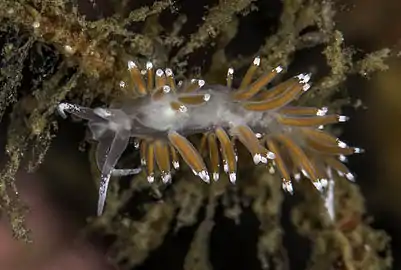Microchlamylla gracilis
Microchlamylla gracilis, sometimes known by the common name slender eolis, is a species of sea slug, an aeolid nudibranch, a marine gastropod mollusc in the family Flabellinidae.[2]
| Microchlamylla gracilis | |
|---|---|
 | |
| The nudibranch Microchlamylla gracilis, Gulen Dive Centre, Norway. | |
| Scientific classification | |
| Domain: | Eukaryota |
| Kingdom: | Animalia |
| Phylum: | Mollusca |
| Class: | Gastropoda |
| Subclass: | Heterobranchia |
| Order: | Nudibranchia |
| Suborder: | Cladobranchia |
| Superfamily: | Fionoidea |
| Family: | Flabellinidae |
| Genus: | Microchlamylla |
| Species: | M. gracilis |
| Binomial name | |
| Microchlamylla gracilis | |
| Synonyms[2] | |
| |
Distribution
This species was described from Cullercoats, North Sea. It is a fairly common species found in current-swept sites from northern France to Norway and Iceland. It is also reported from the East coast of North America from Newfoundland south to New England.[3]
Description
This Microchlamylla has a narrow body and cerata in well defined clusters. The cerata have a narrow band of white pigment at the tip which is often broken into spots. Mature animals typically measure 12–15 mm in length.[4] The maximum recorded body length is 25 mm.[5]
Ecology
Minimum recorded depth is 0 m.[5] Maximum recorded depth is 33 m.[5]
The diet of this species is hydroids of the genus Eudendrium.
References
- Alder J. & Hancock A. (1844). Description of a new genus of nudibranchiate Mollusca, with some new species of Eolis. Annals and Magazine of Natural History 13: 161-167, p.166.
- Picton, B. (2017). Microchlamylla gracilis (Alder & Hancock, 1844). In: MolluscaBase (2017). Accessed on 2017-12-20
- Rudman, W.B., 1999 (August 28) Flabellina gracilis (Alder & Hancock, 1844). [In] Sea Slug Forum. Australian Museum, Sydney.
- Picton, B.E. & Morrow, C.C., 2010. Microchlamylla gracilis (Alder & Hancock, 1844) [In] Encyclopedia of Marine Life of Britain and Ireland.
- Welch J. J. (2010). "The “Island Rule” and Deep-Sea Gastropods: Re-Examining the Evidence". PLoS ONE 5(1): e8776. doi:10.1371/journal.pone.0008776.